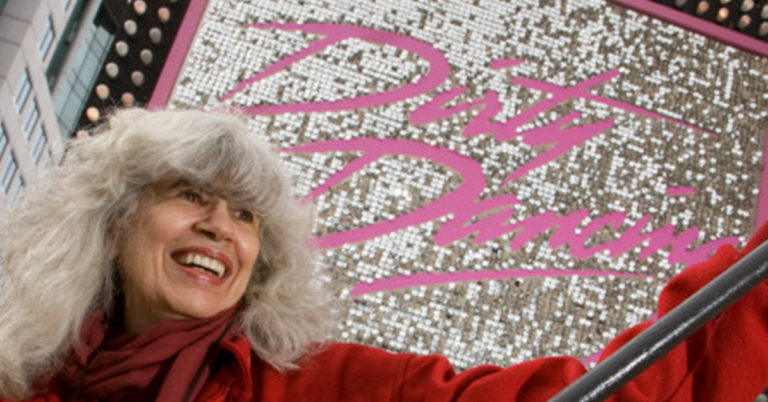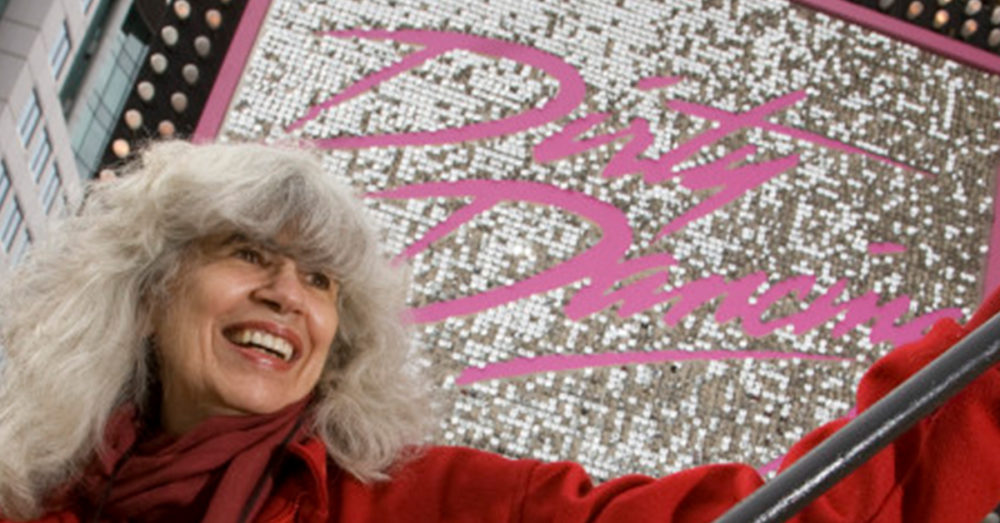9 Big Takeaways from DIRTY DANCING Screenwriter Eleanor Bergstein

Dirty Dancing is one of those great movies that still delights us after 31 years. Taking place over one summer in the Catskills, themes of honor, loyalty, idealism, class and romantic love gives this movie depth that proves it’s more than just a dance flick. Not only are the two leads, Baby (Jennifer Grey) and Johnny (Patrick Swayze) compelling, well-rounded characters on their own, together, they are unstoppable and their chemistry on the dance floor has yet to be replicated in any modern film. The dancing, the music, the social commentary all come together in this gem of a film that almost didn’t happen.
In the latest episode of the podcast To Live and Dialogue in LA, Aaron Tracy chats with the self-described “indefatigable” screenwriter Eleanor Bergstein about writing the script and her fight to keep the music (and the abortion) in the movie.
1. Fight for what you believe in.
Most of us love to sing along to “The Time of My Life,” an original song, written for Dirty Dancing, but most of the other music in the film came from Bergstein’s old 45s she listened to as a kid. She chose every song for a reason and wrote them into the script – a risky idea considering screenwriters almost never get to pick music for their movie. Despite Bergstein being a producer on the film, she admits having to fight tooth and nail to get the songs she wanted. In the podcast, she says to Tracy, “Would you like to see the scars [on my body]? I had to crawl over broken glass!” She says the studio wanted a pop artist like Fine Young Cannibals or the Blow Monkeys to record songs. “I said ‘No,’ you’ll ruin the movie,” she said. Eventually, she won out and got the music she wanted.
2. It’s not enough for two people to fall in love.
Every character, whether it’s a drama or comedy, needs to have a wound – something that makes them vulnerable. But they also need something that makes them noble (this can be learned through the movie).
“[Baby and Johnny] are two people with honor and a crack inside that wants to heal by making the world better. It’s a love story but it’s also about honor. If you reach out your hand and behave with honor, at some point the world will turn on its axis and that’s what happened with Baby. She was very brave, she reached out her hand and Johnny, who believed in nothing, saw someone behave with absolute selfless honor toward him and that’s what gave him the courage to pull her back,” says Bergstein.
3. Every character needs an arc.
Surprisingly, Bergstein says Johnny has a bigger arc than Baby. “He changes more than she does.” Bergstein goes on to say that at a certain point Baby loses faith that the world is a good place, but it’s Johnny who tells her she’s wrong. “They reverse roles,” she says. Johnny becomes the optimist and brings Baby back to the idealism she had once before.
4. Social class matters.
According to Bergstein, there are multiple social classes at the Catskills resort.
“There’s the staff, there’s the middle-class guests, there’s the working class – there are two kinds of staff: college boys working their way through law school and the kids who do the yard work and go back to filling station. There’s Max, the owner. There’s the doctor, Baby’s father who does not have much money but is there as a guest of the owner. Then there are the richer people above like Vivian’s husband.”
Class matters because it informs character. Each character from a different social class will behave differently, and when they interact, there are often predisposed or unconscious biases. Understanding the social class your own characters are from helps to create dynamic, complicated characters.
5. Find filmmakers that get you.
Everybody hated the script when it first made rounds, Bergstein admits.
“It was just when Flashdance and Footloose and Saturday Night Fever [had come out].” She says she thinks it would have been a disaster if a big studio had released Dirty Dancing because, “None of those [other] films are reality-based. They would have turned [Dirty Dancing] into one of those fables.”
6. Maybe sending music with your script isn’t a great idea.
Bergstein admits she began sending a cassette tape with the script because she thought if people could listen to the tape of 60s music while they read the screenplay – or at least on the drive home – they would be as charmed by it as she was and see the value in making the movie. No big studios bought the script but after a few months, “I would get a little note, often from the secretary of the man who turned it down, saying, ‘He’s been playing [the cassette] in his car and it’s worn out, could you send him another cassette please?’”
7. Keep excessive description out of your screenplay.
It’s kind of hard to believe but Bergstein had 60 pages of dance description for her screenplay. Not knowing if it’s okay to put this much description in the script, Bergstein called one of the writers of Saturday Night Fever to get his advice. “I called him up… and said I’m writing a dance-musical and I have one very quick question… Did you put the dance description in the script? He said, ‘What?’ I said I have 60 pages of dance description and I don’t know whether I’m supposed to put it in the script or not.” He said, ‘I don’t have time for you!” and slammed down the phone.” Being treated so poorly really hurt Bergstein’s feelings. She says she’ll talk to anyone who calls her so she can avoid making someone else feel that way.
8. Handling controversial topics can be tricky.
Bergstein was very concerned about the abortion scene because she wanted the audience to be clear that Penny suffered a botched abortion. “I put a lot of purple language in: dirty knife, folding table, screaming in the hall. I didn’t want people to think she had an appendectomy that went badly.”
When an acne medication company wanted to sponsor the film, Bergstein was told the abortion scene would have to be cut out. “I said, ‘I’d be so happy to do that, but it’s the reason for the dancing, it’s the reason Baby meets Johnny, that she learns to dance, they have sex and fall in love, it’s the reason that her father gets involved, without [the abortion] the whole story falls apart.” The sponsor dropped out and the abortion scene stayed in.
Bergstein says, that if you want to put a moral message in your story, “Make sure it’s written into the whole story and it’s the reason the story takes place, otherwise it will end up on the cutting room floor.”
9. Bergstein’s advice to writers.
When things look tough and you’re feeling discouraged, “Just pick yourself up off the floor again, and again, again, and again. Something that is enormously popular seems inevitable but it never is. The only way it will be inevitable is if it’s a copy of something that’s been done before and who wants to do that? If it’s something nobody has done before you’ll get a lot of pushback and misery. Staying power is all. I will be indefatigable, sit in the face of scorn, I will fight… Make sure [screenwriting is] your ambition because it’s an awful lot of work.”
Listen to the podcast on iTunes here.
 Shanee Edwards graduated from UCLA Film School with an MFA in Screenwriting and is currently the film critic for SheKnows.com. She recently won the Next MacGyver television writing competition to create a TV show about a female engineer. Her pilot, Ada and the Machine, is currently in development with America Ferrera’s Take Fountain Productions. You can follow her on Twitter: @ShaneeEdwards
Shanee Edwards graduated from UCLA Film School with an MFA in Screenwriting and is currently the film critic for SheKnows.com. She recently won the Next MacGyver television writing competition to create a TV show about a female engineer. Her pilot, Ada and the Machine, is currently in development with America Ferrera’s Take Fountain Productions. You can follow her on Twitter: @ShaneeEdwards
For all the latest ScreenCraft news and updates, follow us on Twitter, Facebook, and Instagram.
Get Our Screenwriting Newsletter!
Get weekly writing inspiration delivered to your inbox - including industry news, popular articles, and more!



























